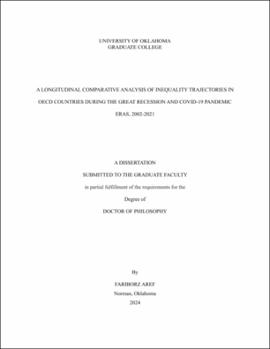| dc.description.abstract | This dissertation investigates income, labor, health, and gender-based labor inequalities across Organization for Economic Cooperation and Development (OECD) countries, emphasizing how these disparities are exacerbated by the COVID-19 pandemic and the Great Recession. Employing a longitudinal comparative methodology grounded in Exogenous Shocks theory, Institutional theory, Welfare Regime Theory, and Skill-Biased Technological Change, this study employs Exploratory Data Analysis of time-series, Mixed Models for Repeated Measures (MMRM), and Generalized Estimating Equations (GEE) to identify evolving trends during these crises, assess their impact on welfare regimes, and conduct detailed analyses of gender-related labor market disparities.
The findings reveal rising inequalities, with notable spikes in income disparity in specific countries, heterogeneous trends during the crises, and varied effects on labor force inequality across countries. The pandemic exerted a substantial, though divergent, influence on health disparities, highlighting the widespread impact on income, labor, health, and gender labor disparities across OECD countries.
This research also evaluates the impact of global events on welfare regimes, uncovering diverse effects on income inequality and fluctuations in employment and unemployment rates. Findings indicate a decline in life expectancy across all regimes during the pandemic, accompanied by increases in infant mortality rates compared to the Great Recession period. The study highlights the varied influence of global crises on welfare regimes and their associated socio-economic disparities. Additionally, it undertakes a comparative analysis of gender labor inequalities during these periods, identifying a significant influence of the pandemic on the gender employment gap, differentiated effects on gender employment disparities, and a unique interplay between the pandemic and the gender unemployment gap. Gross Domestic Product (GDP) emerged as a critical determinant, elucidating the overarching economic dynamics that influence gender disparities in the labor market during these crucial times. Finally, this study elucidates empirical evidence suggesting pathways for mitigating observed inequalities across OECD countries. It emphasizes the importance of reinforcing labor markets, bolstering gender equality in occupational contexts, and methodically revising economic paradigms to align with current and future needs. Moreover, the research posits that evaluating existing welfare regimes could yield a framework adept at confronting the multifaceted challenges posed by globalization, thereby enhancing societies' adaptive capacity to global crises. | en_US |
